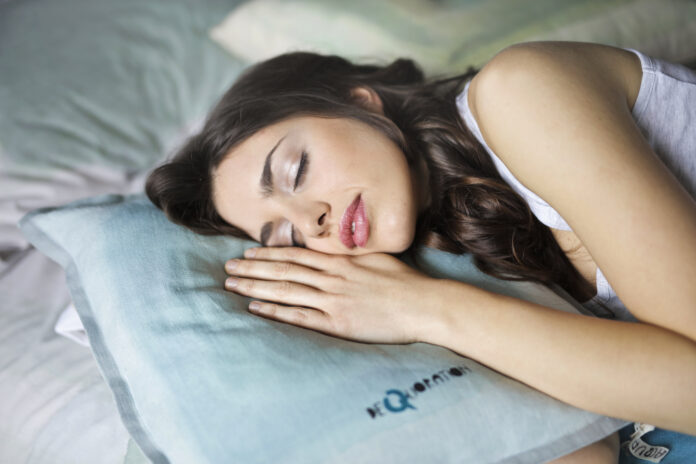Everyone has to sleep, but when one has sleep apnea, the quality of sleep may not be very good. You may be able to pick up some highly effective suggestions for treating your sleep apnea by checking out the advice presented below. A few simple changes could be all that stand between you and the healthy, natural sleep you deserve.
Sleep apnea can be connected to your weight. If you are overweight, consider going on a diet to lose a few pounds. Studies have shown that overweight people who suffer from sleep apnea were able to improve their symptoms by losing about 25 pounds in a year: give it a try!
Consider using a mouth guard when you sleep. If your jaw is improperly aligned, this could lead to issues with sleep apnea. The alignment of your jaw has a lot to do with whether or not you are getting sufficient airflow. Being fitted for a mouth guard can help your breathe while it’s correcting the problem.
Consider sleeping sitting up if you have sleep apnea, and you do not have a CPAP available. Perhaps you have been diagnosed with sleep apnea, but you have not had your CPAP prescribed yet. Maybe the power went out, and your CPAP will not work without electricity. Whenever you have to sleep without the benefit of CPAP therapy, sleeping sitting up will help to keep your airway from collapsing.
If you do not know if your snoring is from sleep apnea or just simple snoring, try using a sleep diary. In this diary, you will need to record how much time you spend in bed, the number of times that you awaken each night, and how tired you feel when you arise in the morning.
If you are going to be hospitalized for any reason, bring your CPAP with you to ensure you get restful sleep. You need to take your CPAP machine with you whenever you go to the ER or any routine hospitalization, such as for surgery. It already has your pressure settings dialed in, and your mask is something your used to wearing at night. Your whole hospitalization process will go much smoother because of this.
A good way to help your sleep apnea might be to shed some extra weight. Getting rid of those extra pounds can help you with your sleep apnea. Even a loss of a few pounds has been beneficial in opening the airway.
Drink one cup of caffeinated coffee a few hours before you go to sleep. It may seem silly to drink a caffeine drink at night, but this can actually help keep your throat open while you sleep. You may have to play around with what time you drink the coffee to avoid restlessness.
Doctors often recommend that sleep apnea patients consider treatment with a CPAP – Continuous Positive Airway Protection – mask and machine. The machine sends air through a hose to a mask covering your nose. The purpose is to help keep your airway open so you are breathing normally as you sleep. While the machine may initially seem a little foreign and uncomfortable, a great many patients adapt quickly and find they are getting much more restful sleep as a result.
On easy way to help limit your sleep apnea is to stick to regular sleeping hours. When you stick to a sleep schedule that is steady and consistent, you will be more relaxed and sleep much better. Apnea episode frequency will be greatly reduced if you can get plenty of sleep every night.
If you think that you may have sleep apnea, set up a video of yourself as you sleep. Just be sure that the video recorder has sound capability. When you wake up, look at the video, and if it seems like something other than snoring is going on, it may be time to go to the doctor.
One method you can try to improve your condition is to strengthen your throat muscles. When the soft tissue of the throat collapses, the airway becomes blocked and sleep apnea occurs. If your muscles are stronger, their chances of collapsing and blocking your airways are minimized.
Prior to going to bed, it is important to open up your nasal passages. This is so that you get enough air flow. To open up the nasal passages, you may want to use saline spray, a nasal dilator, a neti pot, breathing strips or whatever your doctor may have recommended.
Sleep apnea is caused by a blockage when you are sleeping, that results in a cessation of breathing. In order to address this, you can buy an over the counter nose strip. This will help ensure that your airways are open for the duration of your sleep, and as such you will not be affected by sleep apnea.
One thing you can try if you suspect that you have sleep apnea is sleeping on your side instead of on your back. While this may not help if you are very overweight, it can reduce the effects of gravity on your airway. You can sew a pocket at the back of your PJ top and place a small ball in it, if need be, to keep yourself off your back.
Snoring and sleep apnea are two, totally different things. It’s important that you know the difference between the two so you can see your doctor if you think you have it. Signs of sleep apnea include extremely loud snoring, fatigue in the daytime, choking or gasping for air at nighttime and labored breathing.
Not only does sleep apnea make most aspects of life more difficult to deal with, it can also increase the risk for long-term health problems. Do what you need to do to manage your sleep apnea and get the sleep you need. Life can be difficult enough, and you shouldn’t have to go through it without sufficient sleep!



